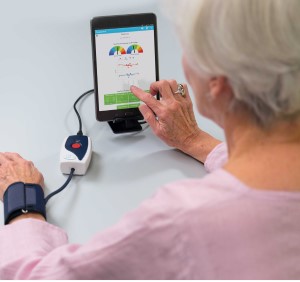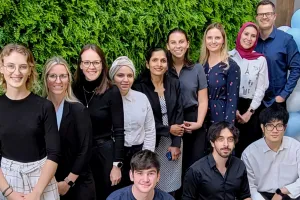Can virtual care after surgery reduce patient returns to hospital? Research study now open in Ottawa
 Photo by Cloud DXCOVID-19 has accelerated the adoption of all kinds of virtual health care, from phone and video appointments to tools that monitor symptoms remotely. The Ottawa Hospital continues to be at the forefront of this trend with the launch of an innovative clinical trial that will test whether enhanced virtual care can help patients recovering at home after emergency surgery.
Photo by Cloud DXCOVID-19 has accelerated the adoption of all kinds of virtual health care, from phone and video appointments to tools that monitor symptoms remotely. The Ottawa Hospital continues to be at the forefront of this trend with the launch of an innovative clinical trial that will test whether enhanced virtual care can help patients recovering at home after emergency surgery.
Half of the patients in the trial will receive regular care, while the other half will receive an in-home monitoring kit containing devices to measure their weight, blood oxygen levels, blood pressure, breathing rate, temperature and pulse. For 15 days they will use the devices to record and enter their vital signs, have a video call daily with a virtual care nurse, and complete daily health surveys. These activities will continue every other day for the next 15 days.
A virtual care nurse will monitor patient vital signs, discuss symptoms, review medications and refer patients to a physician as required. Physicians can modify treatments, or have patients come to an out-patient facility if required.
The Ottawa Hospital is one of a number of hospitals across Canada participating in the clinical trial, which is led by the Population Health Research Institute, a joint institute of McMaster University and Hamilton Health Sciences. The trial is expected to involve 900 patients. Drs. Manoj Lalu and Gavin Hamilton are the lead investigators for The Ottawa Hospital site.
"The hope is that this enhanced virtual care will reduce complications in patients after surgery and keep them out of hospital," said Dr. Lalu, an associate scientist at The Ottawa Hospital and assistant professor at the University of Ottawa. "This is more important than ever during this time of COVID-19."
Eligible patients will be approached after their surgery. Those who agree to participate in this study will be randomized to receive either usual care or the at-home monitoring.
Local Collaborators: Alan Forster, Colin McCartney, Sudir Sundaresan, Suzanne Madore, Dean Fergusson
Perioperative Physician Group: Samanthan Halman and James Chan (Leads), Weiwei Beckerleg, Heather Clark, Catherine Code, Catherine Gray, Shipa Gupta, Shawn Hicks, Greg Krolczyk, Daniel McIsaac, Daniel Dubois, Colleen McFaul, Stephane Moffett, Purnima Rao, Babak Rashidi, Josh Robert, Melissa Rousseau, Youssef Tawil, Sarah Tierney, Kathryn Wheeler, Dominique Yelle
Perioperative Virtual Nursing Unit: Marnie Houlhan, Susan Madden, Michelle Bougie, Alexandra Heuthorst, Tanya Lachapelle, Lee Lamb, Li Marje, Janelle Lavadia, Christine Yrenaya-James
Surgical Leads: Husein Moloo, Randa Berdusco, Rodney Breau Dailbor Kubelik, Jad Abou Khalil, Guillaume Martel, Moein Momtazi, Michael Odell, Andrew Seely, John Sinclair, Humberto Vigil
TOH Virtual Care Team: Reece Bearnes, Heather Clark, Janet Graham, Navya Kalidindi, Bryan Feenstra, Alison Jennings
TOH Site PVC-RAM Trial Team: Ivy Salter, Mary Lou Crossan, Joseph Cyr, Grace Fox
Funding: Roche Canada COVID-19 Innovation Grant, The Ottawa Hospital Academic Medical Organization (TOHAMO). This study is also part of The Ottawa Hospital's COVID-19 virtual care innovation program, which is funded by The Ottawa Hospital Foundation's COVID-19 Emergency Response Fund.
Research at The Ottawa Hospital is possible because of generous donations to The Ottawa Hospital Foundation.
The Ottawa Hospital is a leading academic health, research and learning hospital proudly affiliated with the University of Ottawa.
Media Contact
Amelia Buchanan
Senior Communication Specialist
Ottawa Hospital Research Institute
Office: 613-798-5555 x 73687
Cell: 613-297-8315
ambuchanan@ohri.ca
Learn more about:
The Ottawa Hospital is a leading academic health, research and learning hospital proudly affiliated with the University of Ottawa and supported by The Ottawa Hospital Foundation.


